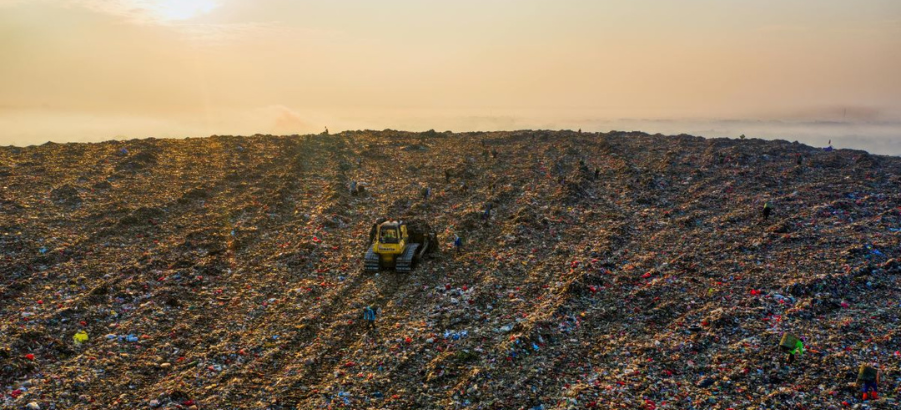Dubai 2027 landfill ban: How Dulsco Environment is powering a zero-waste future
02 July, 2025
“The transition to a landfill-free future requires collective ownership and a shift in mindset across society, from policy makers and industry leaders to everyday consumers”, says Marke
Dubai residents are likely to see the landfills in the emirates closed as Dubai Municipality has announced its plan to do so by 2027, three years ahead of the previously announced schedule. This was revealed during a media briefing hosted by the Government of Dubai Media Office (GDMO) as part of its ‘Meet the CEO’ series, featuring Marwan bin Ghalita, Acting Director General of Dubai Municipality, and various CEOs from the civic body.
Construction Week Middle East sits down with Antony Marke, Interim CEO of Dulsco Environment, to explore the company’s pivotal role in supporting Dubai Municipality’s landfill-free vision by 2027. In this conversation, Marke shares insights on how Dulsco is enabling construction companies to transition towards waste-to-energy systems, the broader impact on the circular economy, and what this means for the future of sustainable development in the UAE.
With a firm commitment to environmental stewardship, Dulsco Environment continues to lead the way through innovative practices, strategic circular economy investments, and sustainable waste management solutions that align with global best standards.
What role do you see Dulsco Environment playing in supporting Dubai Municipality’s landfill-free vision?
We see ourselves as key enablers of Dubai Municipality’s landfill-free vision. Since its inception, Dulsco Environment has been committed to sustainability and circular economy principles, values that closely align with Dubai Municipality’s landfill-free vision and the UAE’s broader environmental goals.
Our extensive waste management infrastructure includes a Refuse-Derived Fuel (RDF) plant, state-of-the-art Materials Recovery Facility (MRF), and dedicated Construction & Demolition (C&D) Waste Recycling Plants. We also operate a Liquid Waste Treatment Facility, all of which contribute to significantly reducing landfill dependency.
Our efforts result in high-value end products such as recycled aggregates, road base, treated water, recovered oil, and alternative fuels like RDF. In fact, for every tonne of waste we divert from landfill, we help clients avoid approximately 2.6 tonnes of CO₂-equivalent emissions delivering both environmental and financial value.
Notably, our C&D Waste Recycling Plants developed in collaboration with the Ministry of Climate Change and Environment and the Ministry of Presidential Affairs divert up to 93% of C&D waste from landfills, recovering valuable materials for reuse in new developments.
Looking ahead, we plan to scale our operations further and make strategic investments in new technologies and infrastructure to support the government’s zero-waste ambitions.
Are there plans to introduce new technologies, such as waste-to-energy or advanced sorting systems, to support this transition?
Our existing MRF already deploys advanced sorting systems, to maximise recovery and reduce contamination. Whereas, our RDF facility in Dubai Industrial City uses advanced pre-treatment, shredding, and drying technologies to transform non-recyclable waste into high-calorific fuel, offering a sustainable alternative to coal used in cement kilns and other industrial applications.
As we look at expanding the scale of our operations, we are actively exploring additional technologies such as AI-powered waste equipment. These forward-looking solutions will be critical to supporting the 2027 landfill ban and advancing the UAE’s low-carbon, circular economy.
How is Dulsco Environment helping construction companies adjust to this change and improve sustainability?
Today, C&D waste is one of the largest contributors to landfill volumes, and we work closely with contractors and developers to address this challenge.
Through our dedicated C&D Waste Recycling Facility we enable up to 95% diversion from landfill by recovering reusable materials like aggregates, sand, and sub-base. We also provide in other facilities on-site segregation services, sustainability consulting, and compliance reporting to help construction firms align with regulations and embed circular practices in their operations.
To support future demand, we are expanding our facility footprint, forging new partnerships, and investing in next-generation recycling technologies. This ensures long-term scalability, resilience, and a sustainable future for the construction sector.
How can corporations and individuals contribute to achieving the landfill-free goal? What are some immediate steps they can take?
The transition to a landfill-free future requires collective ownership and a shift in mindset across society, from policy makers and industry leaders to everyday consumers. While large-scale infrastructure and regulatory measures are vital, meaningful progress begins with the actions of corporations and individuals.
For corporations, the most immediate step is to conduct a comprehensive waste audit to understand the types and volumes of waste generated. This allows them to identify opportunities for reduction, segregation, and recycling. Implementing source-segregation systems is critical ensuring materials such as plastics, metals, organics, and e-waste are separated before collection. Additionally, corporations can adopt sustainable procurement practices and partnering with waste management providers to ensures that waste is handled responsibly and diverted from landfills wherever possible.
When it comes to individuals, the journey most often starts at home. Simple habits like segregating recyclables, avoiding single-use plastics, choosing reusable or refillable alternatives, and reducing food waste can have a significant cumulative impact.
At Dulsco Environment, we run numerous public education campaigns, school programs, and community partnerships that help individuals and businesses understand their role in the waste value chain. Ultimately, every small action contributes to a larger movement and the more stakeholders we engage, the closer we get to realising a landfill-free UAE.
How will the closure of landfills impact the overall circular economy in the UAE? What opportunities do you foresee emerging?
The closure of landfills marks a big shift in the UAE’s environmental strategy. It signals the end of linear consumption models and the beginning of a true circular economy, where waste is viewed as a resource.
We anticipate several opportunities to come from this announcement. First and foremost, there will be a need for recycling infrastructure and localised material recovery facilities. Also, we will see an increase in green innovation and entrepreneurship. Solutions such as upcycling, bio-based materials, alternative fuels like RDF, and closed-loop supply chains will become increasingly viable and commercially attractive.
Thirdly, this shift will stimulate job creation across the green economy, particularly in sectors like recycling, logistics, technology, environmental consulting, and product innovation. Educational institutions will also have an opportunity to align curricula with the emerging green skills economy.
At Dulsco Environment, we are already working with stakeholders across the value chain to build scalable models for circularity. By expanding our RDF production, enhancing our MRF capabilities, and facilitating the recovery of high-quality materials from C&D waste, we’re working towards UAE’s Net Zero goals.
What are the biggest challenges Dulsco Environment anticipates in achieving a landfill-free future, and how do you plan to overcome them?
One of the biggest challenges is the low level of segregation at source. Despite increasing awareness, a significant portion of waste still arrives at processing facilities as mixed streams, making material recovery more complex, resource-intensive, and less efficient. Achieving higher diversion rates will require large-scale behaviour change among households, businesses, and institutions.
Compounding this issue is the limited availability of strong end-markets for certain recycled materials. While metals and high-grade plastics are consistently in demand, low-grade plastics and mixed recyclables often lack viable commercial.
To overcome these hurdles, Dulsco Environment is pursuing a multi-pronged approach that includes launching targeted public education campaigns to drive behavioural change, collaborating with government entities to help shape progressive waste management policies and frameworks.




